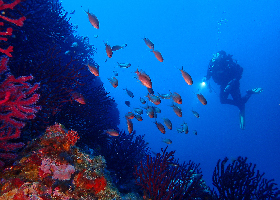Oceans and Human Health: The Importance of Marine Ecosystems on Human Health and Wellbeing
A special issue of International Journal of Environmental Research and Public Health (ISSN 1660-4601). This special issue belongs to the section "Environmental Health".
Deadline for manuscript submissions: closed (15 February 2021) | Viewed by 64104

Image courtesy of Lluís Mas Blanch
Special Issue Editors
Interests: oceans and human health; seafood security and safety; marine recreational activities and health; conservation of healthy marine ecosystems
Interests: oceans and human health; public health; health promotion; nutrition; marine food security; marine recreational activities and health; conservation of healthy marine ecosystems
Special Issue Information
Dear Colleagues,
The Oceans and Human Health (OHH) topic addresses different aspects that have often been treated independently but in reality are closely related, such as the conservation of marine ecosystems, the promotion of health, and the prevention and treatment of certain diseases. The aim of this Special Issue is to attract papers about the relationship between marine ecosystems and human health and wellbeing. We encourage original research submissions and systematic reviews focusing on the relationship between marine ecosystems’ goods and services and public health. We welcome studies that examine (a) the benefits (e.g., omega 3 fatty acids, proteins) and risks (e.g., parasites, contaminants, biotoxins) of seafood consumption on people’s health (cardiovascular risk, cancer, allergies, mental health, etc.) and (b) the benefits of maritime and costal recreational activities such as swimming, scuba diving, sailing, etc. on the health and wellbeing of people (healthy or suffering any pathology). Studies incorporating different disciplines (marine and fisheries biology and ecology, medicine, epidemiology, veterinary, marine policy, and social sciences) that link directly to the OHH topic are welcome. We particularly encourage those studies that consider the relevance of the marine ecosystem’s preservation (e.g., through marine protected areas and other management tools) to human health, food security and wellbeing and the sustainability development goals.
Dr. Josep Lloret
Dr. Bruce Maycock
Guest Editors
Manuscript Submission Information
Manuscripts should be submitted online at www.mdpi.com by registering and logging in to this website. Once you are registered, click here to go to the submission form. Manuscripts can be submitted until the deadline. All submissions that pass pre-check are peer-reviewed. Accepted papers will be published continuously in the journal (as soon as accepted) and will be listed together on the special issue website. Research articles, review articles as well as short communications are invited. For planned papers, a title and short abstract (about 100 words) can be sent to the Editorial Office for announcement on this website.
Submitted manuscripts should not have been published previously, nor be under consideration for publication elsewhere (except conference proceedings papers). All manuscripts are thoroughly refereed through a single-blind peer-review process. A guide for authors and other relevant information for submission of manuscripts is available on the Instructions for Authors page. International Journal of Environmental Research and Public Health is an international peer-reviewed open access monthly journal published by MDPI.
Please visit the Instructions for Authors page before submitting a manuscript. The Article Processing Charge (APC) for publication in this open access journal is 2500 CHF (Swiss Francs). Submitted papers should be well formatted and use good English. Authors may use MDPI's English editing service prior to publication or during author revisions.
Keywords
- oceans and human health
- risks and benefits
- seafood consumption
- maritime recreational activities
- mental and physical health
- wellbeing
- blue spaces
- blue health
- overfishing, plastic pollution
Benefits of Publishing in a Special Issue
- Ease of navigation: Grouping papers by topic helps scholars navigate broad scope journals more efficiently.
- Greater discoverability: Special Issues support the reach and impact of scientific research. Articles in Special Issues are more discoverable and cited more frequently.
- Expansion of research network: Special Issues facilitate connections among authors, fostering scientific collaborations.
- External promotion: Articles in Special Issues are often promoted through the journal's social media, increasing their visibility.
- e-Book format: Special Issues with more than 10 articles can be published as dedicated e-books, ensuring wide and rapid dissemination.
Further information on MDPI's Special Issue polices can be found here.






